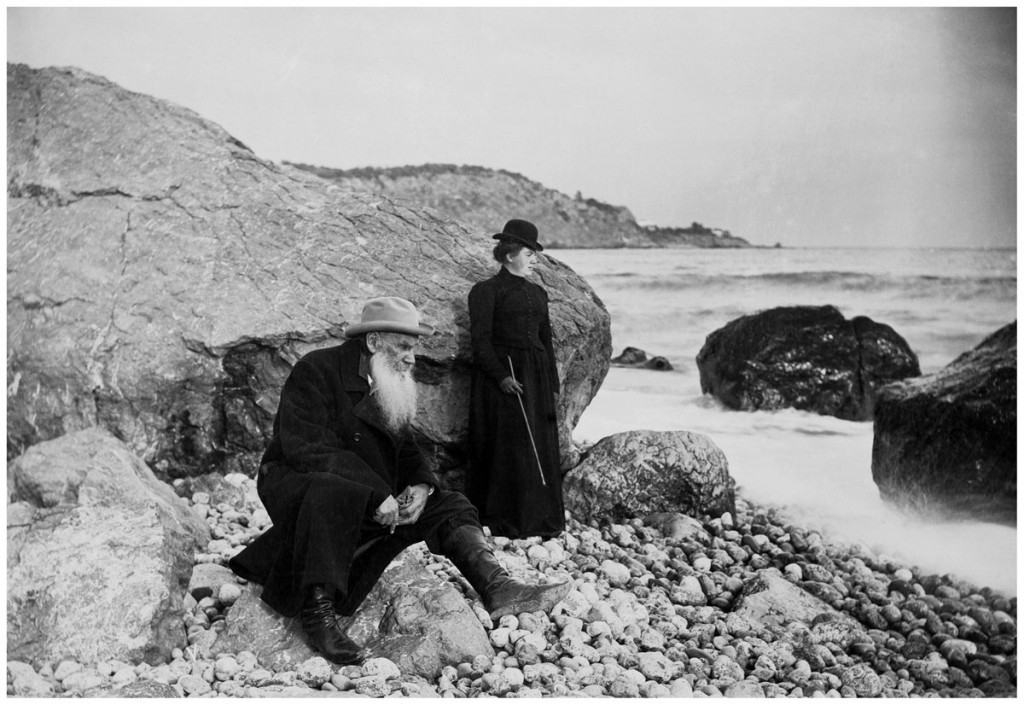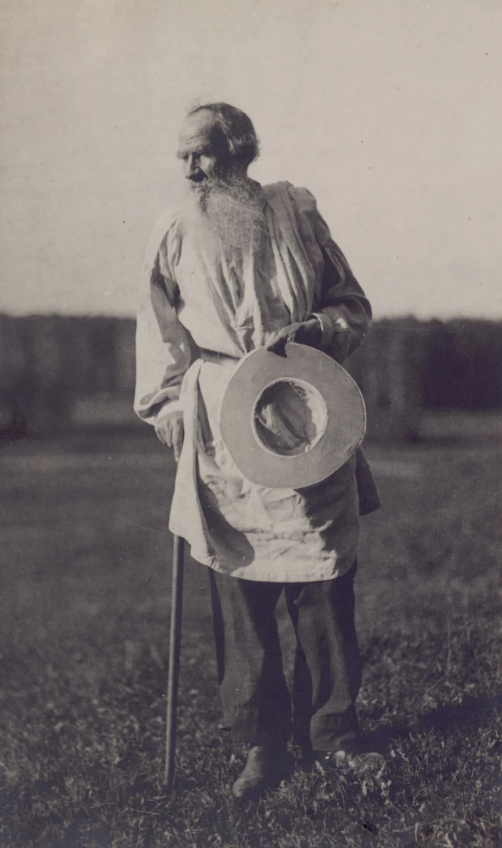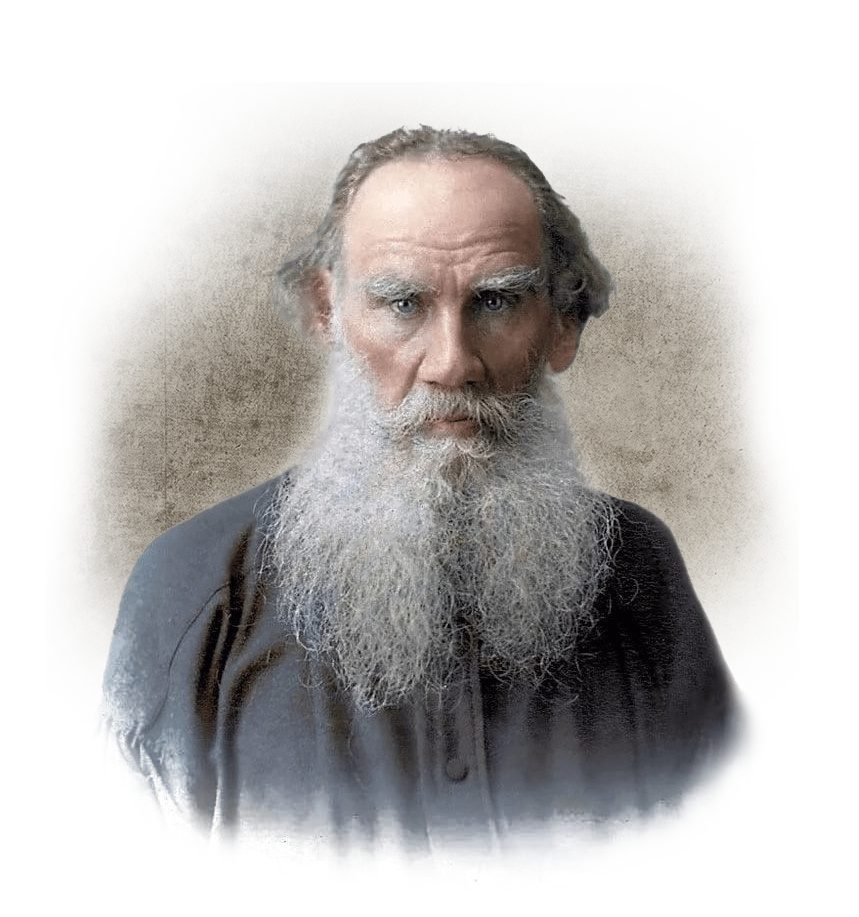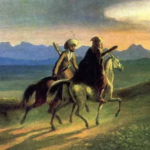
20.12.2022
In his work “The Confession” Tolstoy wrote that from the end of the 1870s he often became tormented by insoluble questions: “Well, okay, you will have 6,000 acres in Samara province – 300 head of horses, and then?”; in the literary sphere: “Well, okay, you will be more famous than Gogol, Pushkin, Shakespeare, Moliere, all writers in the world – and so on! Starting to think about raising children, he asked himself: “what for?”; speculating “on how the people might attain prosperity,” he “suddenly said to himself: what business is it to me?” He “felt that what he was standing on had faltered, that what he was living on was no longer there”.
The natural result was the thought of suicide:
“I, a happy man, hid a shoelace from myself lest I should hang myself on the crossbar between the cupboards in my room, where I was alone every day, undressing, and stopped going hunting with a rifle lest I should be tempted by too easy a way to rid myself of life. I myself did not know what I wanted: I was afraid of life, I strove away from it and, meanwhile, I still hoped for something from it”.
To find an answer to his constantly worrying questions and doubts, Tolstoy, first of all, undertook a study of theology and wrote and published in 1891 in Geneva, his “Study of dogmatic theology,” in which he criticised the “Orthodox-dogmatic theology” of Metropolitan Macarius (Bulgakov). He conversed with priests and monks, visited the elders in Optina Pustyn (in 1877, 1881 and 1890), read theological treatises, talked to the elder Ambrosius, Leontiev, an ardent opponent of Tolstoy’s teaching. In a letter to Filippov dated March 14, 1890, Leontief reported that during this conversation he said to Tolstoy:
“It is a pity, Leo Nikolaevich, that I have little fanaticism. And I should write to St. Petersburg, where I have connections, that you should be exiled to Tomsk and that neither the Countess nor your daughters should be allowed even to visit you, and that little money should be sent to you. Otherwise you are positively harmful”.
To this Lev Nikolayevich exclaimed with passion:
“Dovey, Konstantin Nikolayevich! Write, for God’s sake, that I should be exiled. This is my dream. I’m doing everything I can to compromise myself in the eyes of the government, and I’m getting away with it. Please write”.
To study the primary sources of Christian teaching in the original, he studied ancient Greek and Hebrew (in the study of the latter he was assisted by Rabbi Shlomo Minor of Moscow). At the same time, he looked closely at the Old Believers, became friendly with the peasant preacher Vasily Syutaev, talked to the Molokans, Shtundists. Lev Nikolaevich searched for the meaning of life in philosophy, in acquaintance with the results of exact sciences. He tried to simplify everything as much as possible, to live a life close to nature and the farming way of life.

Tolstoy gradually renounces the vagaries and comforts of a rich life (pollination), does a lot of physical labor, is dressed in plain clothes, becomes a vegetarian, gives the family all his large fortune, renounces the rights of literary property. On the basis of sincere desire for moral improvement creates a third period of Tolstoy’s literary career, the hallmark of which is the rejection of all established forms of government, society and religious life.
At the beginning of the reign of Alexander III, Tolstoy appealed to the emperor in writing for a pardon of the tsare-murderers in the spirit of evangelical forgiveness. From September 1882 a secret surveillance is instituted to clear up relations with the sectarians. In September 1883 he refuses to fulfil his duties as a jury member explaining them by their incompatibility with his religious views. At the same time he was banned from public speaking in connection with the death of Turgenev. Gradually the ideas of Tolstoism begin to permeate society. In early 1885 there is a precedent of refusal of military service in Russia with reference to Tolstoy’s religious beliefs. A large part of Tolstoy’s views could not be expressed openly in Russia and were only fully expressed in foreign editions of his religious and social treatises.
The 1880s mark the advent of Vladimir Grigorievich Chertkov, who had a great influence on Tolstoy and his family and who has been described as the most influential figure in Tolstoy’s milieu from the mid-80s until the writer’s death. After his acquaintance in October 1883 Chertkov quickly became Tolstoy’s confederate and assistant, and from 1886 introduced his wife Anna Diterikhs-Chertkov into the writer’s inner circle. Chertkov and Tolstoy conducted an extensive correspondence, which consists of five volumes of the writer’s collected works. In 1884 Vladimir Grigorievich in collaboration with publisher Sytin has organized a publishing house “Mediator”, which purpose was to publish cheap books available for common people, which published fiction and journalism of moral and ethical character. Chertkov was the only person Tolstoy allowed in at almost any time and without invitation. After organizing his publishing house Chertkov introduced editing of the writer’s texts, which he accepted surprisingly easily. In particular, Chertkov made edits to the text of “The Prisoner of the Caucasus”. One of his ideas was to rewrite the texts of Tolstoy’s old works leaving gaps and wide margins so that he could make new edits. Lev Nikolaevich wrote:
“If Chertkov didn’t exist, it would have to be invented”.
In May 1885 Vladimir Grigorievich and his mother went to England and engaged in publishing in English works of Tolstoy, banned in Russia: the first book published “Confession”, “What is my faith?” and “Summary of the Gospel”. Chertkov’s influence went so far as to suggest in letters to Tolstoy in July 1885 that he abandoned his family, explaining his rejection of Tolstoy’s philosophy by his relatives. All this led to serious family conflicts between Tolstoy and his wife.

There was no unanimity about Tolstoy’s works of fiction written during this period. Thus, in a long series of short stories and legends, intended primarily for popular reading (“What Men Are Alive”, etc.), Tolstoy, according to his unconditional admirers, reached the peak of artistic power. At the same time, according to people, criticizing Tolstoy that he was converted from an artist into a preacher, these are written with a definite purpose artistic sermons were crude and tendentious. The high and terrible truth of “Death of Ivan Ilyich,” according to admirers, putting this work on a par with the major works of Tolstoy’s genius, according to others, deliberately harsh, it sharply emphasized the callousness of high society, to show the moral superiority of the simple “kitchen peasant” Gerasim. The opposite was also true of “Kreutzer’s Sonata” (written in 1887-1889, published in 1890), whose analysis of marital relations made one forget the remarkable brightness and passion with which this work was written. The work was banned by the censors, but was printed thanks to the efforts of Sophia Tolstaya, who succeeded in getting a meeting with Alexander III. As a result, the novel was published in stripped-down form in Tolstoy’s Collected Works by personal permission of the tsar. Alexander III was pleased with the novel, but the Tsarina was shocked. But the folk drama “The Power of Darkness”, according to Tolstoy’s admirers, was a great demonstration of his artistic force: in the narrow confines of an ethnographic representation of Russian peasant life, Tolstoy was able to impose so many universal features that the drama became a resounding success on all world stages.
During the famine of 1891-1892, Tolstoy organized institutions in Ryazan Province to help the starving and needy. He opened 187 canteens, which fed 10,000 people, as well as several canteens for children, distributed firewood, distributed seeds and potatoes for sowing, bought and distributed horses to farmers (almost all farms were deprived during the famine year). On 3 November 1891, Sophia Andreevna published an open letter in the “Russkiye Vedomosti”, with a request to help the starving. In all, the Tolstoys collected over 200,000 roubles in donations during the famine.
The treatise “The Kingdom of God within you…” was written by Tolstoy with short breaks for nearly three years: from July 1890 to May 1893. The treatise, which caused admiration of the critic V.V. Stasov (“the first book of the 19th century”) and I.E. Repin (“this thing of terrible power”), could not be published in Russia because of censorship, and was published abroad. The book began to be illegally distributed in huge numbers in Russia. In Russia itself the first legal edition appeared in July 1906, but even after that it was withdrawn from sale. The treatise was included in Tolstoy’s collected works, published in 1911, after his death.
In his last major work, the novel Resurrection, published in 1899, Tolstoy denounced court practices and high-society life, and depicted the clergy and worship as secularised and merged with secular power.
In the summer of 1909, one of the visitors to Yasnaya Polyana expressed his delight and gratitude for the creation of War and Peace and Anna Karenina. Tolstoy replied:
“It would be like someone coming to Edison and saying, ‘I have great respect for you for being a good mazurka dancer. I attribute importance to my other books altogether (religious!)”.
In the same year, Tolstoy described the role of his works of fiction this way:
“They draw attention to my serious things”.
Some critics of the last stage of Tolstoy’s literary activity have stated that his artistic power suffered from the predominance of theoretical interests and that creativity is now only needed by Tolstoy in order to propagate his social and religious views in a generally accessible form. On the other hand, Vladimir Nabokov, for example, denies Tolstoy’s preachy concreteness and notes that the power and universal sense of his work has nothing to do with politics and simply displaces his teaching:
“In fact, Tolstoy the Thinker was always occupied with only two themes: Life and Death. And these themes no artist can avoid. It has been argued that in his work “What is art?”
Tolstoy partly completely denies and partly significantly diminishes the artistic significance of Dante, Raphael, Goethe, Shakespeare, Beethoven and others, he directly comes to the conclusion that “the more we give ourselves to beauty, the more we distance ourselves from good”, claiming the priority of the moral component of creativity over aesthetics.




